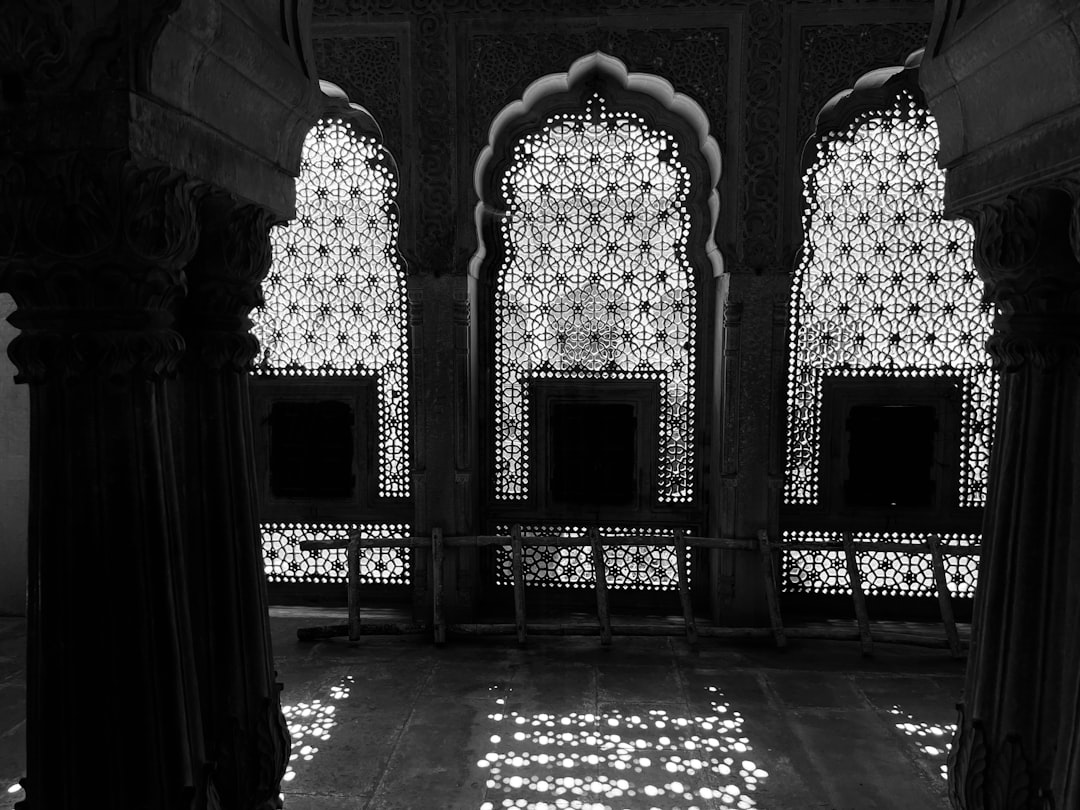There are poems that whisper, and there are poems that consume.
This ghazal by Attar of Nishapur does not whisper; it burns.
It is not a prayer spoken in calm devotion, but a cry from within the flame itself; the voice of one who has already given everything, even the ashes of himself, to love.
Attar’s verses are the record of a disappearance. The poem begins with fire and ends with nothing; no name, no self, not even belief or disbelief. It is the story of how love erases all that is not love.
عشق جانان همچو شمعم از قدم تا سر بسوخت
مرغ جان را نیز چون پروانه بال و پر بسوخت
عشقش آتش بود کردم مجمرش از دل چو عود
آتش سوزنده بر هم عود و هم مجمر بسوخت
زآتش رویش چو یک اخگر به صحرا اوفتاد
هر دو عالم همچو خاشاکی از آن اخگر بسوخت
خواستم تا پیش جانان پیشکش جان آورم
پیش دستی کرد عشق و جانم اندر بر بسوخت
نیست از خشک و ترم در دست جز خاکستری
کاتش غیرت درآمد خشک و تر یکسر بسوخت
دادم آن خاکستر آخر بر سر کویش به باد
برق استغنا بجست از غیب و خاکستر بسوخت
گفتم اکنون ذرهای دیگر بمانم گفت باش
ذرهٔ دیگر چه باشد ذرهای دیگر بسوخت
چون رسید این جایگه عطار نه هست و نه نیست
کفر و ایمانش نماند و مؤمن و کافر بسوخت
Let us walk, then, into this fire.
“The love of the Beloved burned me like a candle, from foot to head;
The bird of my soul, like a moth, burned its wings and feathers.”
Here begins the story of the ashiq, the lover of the Divine, who enters love not as a comfort but as a consuming blaze.
Attar compares himself first to a candle, that most ancient image of mystical devotion. A candle does not shine by preserving itself; it shines by burning. Light is born through loss.
From foot to head, meaning completely, without remainder, he is consumed. The flame of divine love does not leave the body intact; it devours both the outer and inner, the flesh and the thought.
Then comes the second image: the bird of the soul turned moth.
In Persian mysticism, the moth (parvaneh) is the archetype of surrender. It circles the candle, knowing the fire will kill it, and yet it cannot resist. The moth’s death in the flame is not tragedy; it is fulfillment.
So too for Attar: the soul’s wings, symbols of pride, of separateness, must burn away for it to fly into the infinite.
The candle and the moth are not two; they are one mystery told twice, the lover burning and the Beloved being burned into.
“His love was fire; I made my heart its censer of wood;
The burning fire consumed both the wood and the censer.”
The image deepens. Love is now not just the flame, but a sacrificial rite. Attar calls his heart a censer, a vessel where incense burns before the altar of the Divine. The incense, the smoke, the fire, all are metaphors for worship that costs the self.
But love, in his case, becomes so fierce that even the tools of worship perish. The wood of devotion and the vessel of the heart both vanish in the same blaze.
This is the paradox of mystical surrender: at first, one uses devotion to reach God; but once the flame of union rises, even devotion is destroyed. The lover no longer prays; he is the prayer. There is no distinction between offering and offered, worship and worshipper.
Attar is showing us that real love does not decorate the soul; it empties it. The heart must not just burn incense for God; it must become the incense.
“When but one spark of His radiant face fell upon the desert,
Both worlds burned away like straw in that single ember.”
Here the personal becomes cosmic. The fire that burned Attar is no longer confined to his heart; it spreads to the whole universe. One spark from the face of the Beloved, a single ray of divine beauty, sets the entire creation aflame.
Both worlds, this world and the next, material and spiritual, burn to nothing. They are revealed as fragile illusions, straw before the absolute fire of Being.
This is the mystical apocalypse, not destruction for cruelty’s sake, but revelation through burning. When the Real appears, all that is less than real vanishes.
What is left after such fire? Nothing, and that nothing is everything.
“I wished to bring my soul as an offering before the Beloved,
But love was swifter; it burned my soul within my breast.”
There is tenderness in this verse, almost humility. Attar wanted to bring a gift, his soul, to the Beloved, like a devoted servant bringing an offering to the throne. But love, the Beloved’s own flame, anticipated him. Before he could act, his soul was already gone, consumed from within.
This is the moment when the seeker realizes that even surrender is not his doing. The fire does not wait for permission; it is already burning inside him.
The Sufis say: “You think you seek God, but it is God who seeks you.”
Attar lived this truth. He could not offer himself, because he no longer belonged to himself. The offering had already been accepted.
“Of all that was dry or wet, nothing remains but ashes;
The fire of jealousy came, and burned both dry and wet alike.”
The fire now is called the fire of jealousy, atash-e gheyrat. In Sufi thought, this is divine jealousy: God’s refusal to share the lover’s heart with anything else.
Love demands totality. Whatever in the soul still clings to otherness, possessions, pride, fear, even spiritual identity, is burned away.
That is why both “dry and wet”, the extremes, the opposites, the totality of being, are reduced to ashes. Nothing escapes.
This verse is terrifying in its beauty. The fire of divine jealousy is not cruel, it is purifying. It does not tolerate distraction.
To love God is to invite this fire; to be loved by God is to survive nothing but ash.
“At last, I gave that ash to the wind before His gate;
A lightning of His majesty flashed, and even the ashes burned.”
If you thought the fire had finished, Attar corrects you: even ashes can burn again.
Having been reduced to dust, he takes that dust, his last remnant, and releases it to the wind near the Beloved’s door. This is the final gesture of humility: “I am nothing now, O Lord, take what remains.”
But in that moment of ultimate surrender, divine majesty appears, a lightning from the unseen, and consumes even the ashes.
This is the climax of annihilation: when not even the memory of self survives.
Attar’s language glows with paradox, the ashes burn again. It is the burning of the already burned, the erasure of the last trace of “I.”
After this, there can be no further loss; and yet, as we soon learn, even that is not the end.
“I said, ‘Now perhaps one small particle of me remains.’
He said, ‘That particle too is gone, the next particle burned as well.’”
It is almost playful now, this dialogue between the human voice and the infinite flame.
The poet thinks there might still be one “atom” of identity left, a trace of being. But the Divine answers: No, that too is gone. Every particle has burned.
This is the mystical completion; the dissolution of every layer of the self, from body to mind to soul to even the thought of being a soul.
Attar’s “particle” recalls the Sufi doctrine that every atom contains the reflection of God. Once the seeker’s atoms are purified through fire, what remains is only divine light. The human disappears not into emptiness, but into fullness.
“When Attar reached this stage, there was no being and no non-being;
Faith and disbelief vanished; believer and unbeliever burned alike.”
Here the poem ends, not with resolution, but with disappearance.
Khaqani asked for justice; Hafez sought reunion; Rumi sang of return. But Attar reaches beyond all duality, even beyond the opposites of existence and non-existence, faith and disbelief.
This is fanā al-fanā, annihilation of annihilation.
When even belief burns, what remains is the pure Real, unnameable, undivided.
Attar’s final vision is not of heaven or hell, not of union or separation, but of the extinguished self in the boundless fire of God.
It is terrifying, liberating, absolute.
He has crossed the last veil.
The Fire as Metaphor of the Path
This ghazal is the roadmap of the mystic’s journey, told through the language of fire. Each verse is a station in the burning:
-
The Candle: illumination through loss.
-
The Moth: surrender through attraction.
-
The Censer: offering through devotion.
-
The Spark: revelation through annihilation.
-
The Offering: consumed before it is given.
-
The Ashes: purification complete.
-
The Lightning: erasure of even the ashes.
-
The Particle: extinction of self-awareness.
-
The Beyond: silence, where being and non-being dissolve.
Attar does not describe this as tragedy; he describes it as destiny. Love, once awakened, cannot stop until everything false has been burned away.
For him, the only true life is the one born from this burning.
The Mystical Science of Burning
In Persian Sufi language, burning (sokhtan) is both literal and symbolic. It means the dissolution of separation. Fire is the divine element that purifies by destroying form.
When the ego burns, the soul becomes transparent.
When thought burns, pure awareness shines through.
When the lover burns, only love remains.
Attar’s imagery is not violent for the sake of shock; it is precise spiritual science. Each act of burning is a deeper cleansing, a stripping of veils that conceal the Real.
The mystic’s task, then, is not to escape the fire, but to remain within it until nothing but light is left.
The Beauty of Nothingness
By the end, Attar has become nothing. But his nothingness is radiant.
He stands in the state the Sufis call baqā, subsistence after annihilation. Having perished in love, he now endures as love itself.
This nothingness is not void; it is fullness too vast to be named. When he says “there was no being and no non-being,” he points to the mystery where opposites dissolve, where God alone is.
Attar does not preach the destruction of the self as nihilism; he celebrates it as union.
When the “I” burns, what remains is not emptiness, but everything; the whole universe seen as one flame.
Attar and the Tradition of Fire
Before Rumi’s whirling, before Hafez’s ecstasy, there was Attar’s fire. Rumi himself said, “Attar traveled the seven cities of love; we are still at the first alley.”
This ghazal shows why. Attar’s love is not metaphorical; it is absolute.
He transforms the vocabulary of human passion into a cosmic theology. The burning candle, the moth, the ashes; these are not decorative symbols; they are revelations of metaphysical truth.
For him, God is not found in heaven but in the blaze that erases heaven and earth alike.
He does not seek comfort in religion; he seeks the end of all boundaries.
His final verse, where faith and disbelief both burn, is the culmination of that vision.
It is not irreverence, but transcendence. He has gone beyond creed into pure witnessing.
Lessons from the Fire
From Attar’s song of burning, we may draw a few eternal lessons, if we dare:
-
Love begins where safety ends.
The true lover does not bargain; he burns. -
Pain is not punishment, but purification.
The fire strips away illusion until only truth remains. -
Surrender happens before consent.
The Beloved’s fire burns faster than the lover can offer. -
Nothingness is the final gift.
To lose all is to become all. -
Faith and doubt are both veils.
Beyond both lies the naked light of being. -
Even ashes can burn again.
The fire of love is infinite; it consumes, revives, consumes again.
The Flame Within Us
Though written centuries ago, Attar’s ghazal speaks to our modern hunger for meaning. We all feel the slow burn of longing, for truth, for connection, for something beyond the surface of life.
Attar invites us not to flee that fire, but to trust it.
The heat we fear may be the very light we seek.
The dissolution we resist may be our doorway into freedom.
To love in Attar’s sense is to say yes to loss, yes to transformation, yes even to death, for death itself is only the shadow of the final merging.
And what follows the merging?
Not silence, but song.
The song that burns through centuries and still glows on the tongue of every heart that dares to love without measure.
The Final Spark
When Attar writes:
“When Attar reached this stage, there was no being and no non-being;
Faith and disbelief vanished; believer and unbeliever burned alike.”
He does not mourn this annihilation. He celebrates it as completion.
In that fire, there are no names, no sects, no heavens or hells, only flame, infinite and pure.
And in that flame, Attar found eternity.
He who burned away everything, including himself, became immortal in the one thing that never burns: Love itself.





